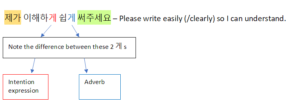Beginner 3 > Lesson 14
Lesson 14. Expressing Intention “In order to” -(으)려고 vs (으)러 / -게 vs -도록
Download Quiz ([으]려고, [으]러, 도록, 게) 📥
Review Note]
The most common way to say your intention is by using the construction:
VERB STEM + (으)려고
This translates to “in order to VERB” or more simply “to VERB”.
(으)려고 separates the intention and the action such that, it forms the pattern:
Intention + (으)려고 + Action
e.g.,
한국어를 잘하려고 매일 공부해요 – In order to be good at Korean, I study everyday
운동하려고 헬스장에 갈 거예요 – I will go to the gym to work out
일찍 일어나려고 일찍 잤어요 – I slept early to wake up early
It is also possible to express intention with the construction:
VERB STEM + (으)러
This uses the same pattern as above and has the same meaning.
e.g., 요리하러 부엌에 갔어요 – I went to the kitchen to cook
*If the stem ends in 받침, use: Stem + (으)려고/(으)러
If the stem doesn’t end in 받침, use: Stem + 려고/러
Differences in usage between (으)려고 vs (으)러 :
These two constructions have the same meanings but are NOT always interchangeable.
Difference 1:
VERB STEM + (으)려고 can be followed by clauses with ANY verbs (including movement verbs)
VERB STEM + (으)러 can only be followed by clauses with MOVEMENT verbs (e.g., 가다(to go) / 오다(to come) )
For example, (으)려고 and (으)러 can both be used in the phrase below because of the following movement verb.
운동하려고 헬스장에 갈 거예요 (O) vs. 운동하러 헬스장에 갈 거예요 (X)
= I will go to the gym to work out.
However, only (으)려고 can be used here since it is not followed by a movement verb.
한국어를 잘하려고 매일 공부해요 (O) vs. 한국어를 잘하러 매일 공부해요 (X)
=In order to be good at Korean, I study everyday.
More examples:
| Phrase | (으)려고 | (으)러 |
I came to the library to study
| 공부하려고 도서관에 왔어요 | 공부하러 도서관에 왔어요 |
I go to meet Jisoo
| 지수를 만나려고 가요
| 지수를 만나러 가요
|
| I will buy a bag in order to give a gift to my friend | 친구에게 선물하려고 가방을 살 거예요 | X |
Irregular combinations to be aware of :
When irregular verbs with ㄷ 받침 (e.g., 듣다) are combined with these conjunctions, the 받침changes from a ㄷ to a ㄹ to aid pronunciation. In this way, using the verb 듣다 as an example, the stem added to (으)려고 or (으)러 would change from듣- to 들- before the conjunction was added. This forms 들으려고 or 들으러.
e.g., 음악을 들으려고 조용한 방에 갔어요 – I went to a quiet room to listen to music
Additionally, irregular verbs ending with ㄹ 받침, don’t need the extra 으when the constructions are added. This forms, using the verb 놀다 as an example, 놀려고 or 놀러 instead of 놀으러 or 놀으려고.
Difference 2:
Another difference between the 2 constructions is that (으)려고 can NOT be followed by phrases/verbs in the *imperative mood whereas (으)러 can.
*Refers to an invitation, command, suggestion or request etc. (e.g., Come. Don’t speak, Let’s go. Please eat.)
e.g.,
Please come to listen to music – 음악을 들으러 오세요 (O) NOT 음악을 들으려고 오세요 (X)
Come visit my house* – 우리 집에 놀러 와 (O) NOT 우리 집에 놀려고 와 (X)
*Note: This phrase is commonly used as a friendly way to invite someone to visit where you live, for example meaning “Come visit__” or “Come over to ___ for a visit”. It is formed using the combination of the verb 놀다 and the construction (으)러 and so literally translates to “come to play”.
놀러 오세요 > 놀러 와요 > 놀러 와 (in decreasing order of formality)
e.g., 언제 한국에 놀러 오세요 – Come visit Korea someday

Imperative mood for verbs other than movement verbs
Since the use of (으)러 is limited to movement verbs, the above use of the imperative mood is also limited to movement verbs. Because of this, other constructions must be used to express your intention when verbs other than the movement verbs are in the imperative mood.
This can either be achieved by using the constructions:
VERB STEM + 게 or VERB STEM + 도록 (they are interchangeable)
Usage 1 : When the action verb is in the imperative mood (except from 가다/오다)
e.g.,
좋은 성적을 받게 공부해 / 좋은 성적을 받도록 공부해 – Study to get a good grade.
내일 일찍 일어나게 일찍 자/ 내일 일찍 일어나도록 일찍 자 – Sleep early to get up early tomorrow.
Usage 2: When the intention’s subject and the action’s subject are DIFFERENT.
This is often the case for sentences in the imperative mood, since the subject of the imperative is the other person, referred to as ‘you’.
e.g.,
모두가 듣도록** 크게 말해 – Speak loudly so everyone can hear.
제가 이해하게 쉽게 써주세요 – Please write easily (/clearly) so I can understand.

**Note: With these 2 constructions(게 & 도록), the extra으 used for verb stems with 받침and the conversion of 듣다 to 들 (as mentioned above) is NOT necessary.
As well as the above usages, 게 and 도록can also be used with plain sentences (not in the imperative). Here, the subjects of the intention and action phrases are still in disagreement.
e.g.,
저는 모두가 듣도록 크게 말했어요 – I spoke loudly so everyone could hear.
제프는 내가 슬프지 않도록 위로해줬어요 – Jeff consoled me so I wouldn’t be sad.
저는 가족들이 저녁을 먹을 수 있도록 집에 일찍 갈 거예요 – I will go home early so my family can eat dinner.

